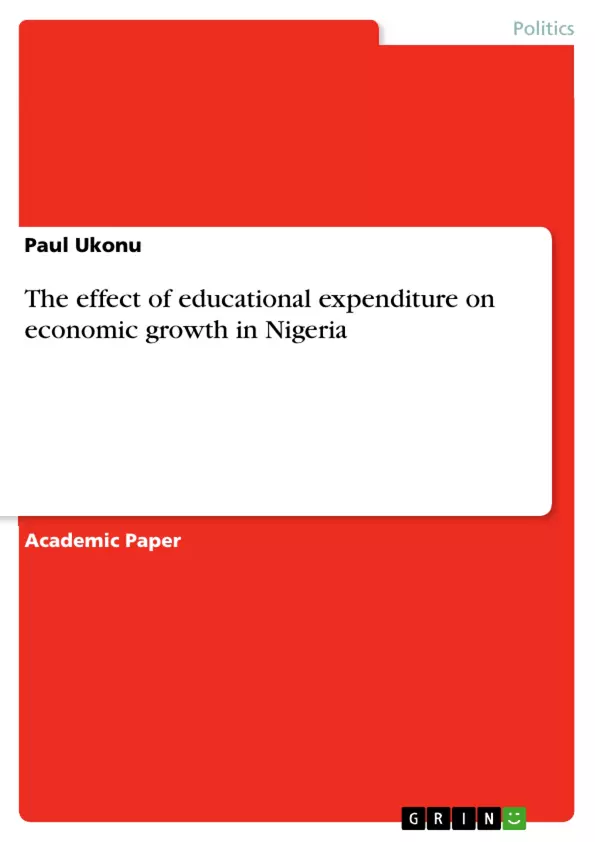This study examined the effect of educational expenditure on the growth a Nations economy, case study Nigeria. The main objective of the study were to analyze the positive impact education has on the growth of the Nigerian economy, we focused more on the tertiary sector, although the educational system in the country has been plagued by poor funding, corruption and unqualified teachers in the system.
The data for the study was collected by secondary source and analyzed using chi-square test and other econometric barometric test. The result from the study shows there is a positive relationship between expenditure in education and the growth of the Nigerian economy.
The study concludes that the right expenditure in the educational sector is important in achieving the much needed growth of the Nigerian economy. The study recommends that more needs to be done for the educational sector to grow in the country, the government needs to channel more funds in the nation’s budget for sector to attain growth else the country will experience more drop out of school pupils which will in-turn affect the development of the country’s economy negatively.
Inhaltsverzeichnis (Table of Contents)
- CHAPTER ONE
- INTRODUCTION
- 1.1 Background to the study
- 1.2 Statement of the Problem.
- 1.3 Research Question
- 1.4 Objectives of the Study...
- 1.5 HYPOTHESIS OF THE STUDY.
- 1.6 SCOPE OF THE STUDY.
- 1.7 JUSTIFICATION OF THE STUDY.
- CHAPTER TWO
- LITETRATURE REVIEW
- 2.0 INTRODUCTION
- 2.1 CONCEPTUAL LITERATURE REVIEW
- 2.1. I. Education.
- 2.1. II. Economic Growth.
- 2.1.1 Theoretical Literature Review
- 2.1.2 Neo-classical growth theory..
- 2.1.3 Endogenous growth model.
- 2.1.4 Growth driven by human capital accumulation
- 2.1.5 Human capital and technological change
- 2.2 EMPIRICAL LITERATURE
- 2.3 GAPS IN THE LITETRATURE
- CHAPTER THREE
- METHODOLOGY
- 3.1 THEORETICAL FRAMEWORK
- 3.1.1 Education and Endogenous Growth....
- 3.2 MODEL SPECIFICATION.
- 3.3 VARIABLE DESCRIPTION AND EXPECTED SIGN
- 3.4 SOURCES AND METHOD OF DATA COLLECTION.
- 3.5 METHOD OF DATA ANALYSIS..
- 3.6 DATA ACCURACY AND RELIABILITY.
- 3.7 THE JUSTIFICATION OF THE METHOD
- 3.8 CAUSALITY TEST
- CHAPTER FOUR
- 4.0 DATA PRESENTATION, ANALYSIS AND DISCUSSION OF RESULTS.
- 4.1 INTRODUCTION
- 4.1.1 Descriptive Statistics.....
- 4.1.2 Correlation Matrix
- 4.2 TIME SERIES PROPERTIES OF THE VARIABLES.
- 4.2.1 Unit Root Test.
- 4.2.2 The effect of educational expenditure on economic growth in Nigeria..........\n
- 4.2.3 The Long-Run Relationship between Educational Expenditure and Economic Growth..\n
- 4.2.4 The Causality between Educational Expenditure and Economic Growth.\n
- 4.3 DISCUSSION OF FINDINGS
- 4.3.1 The Effect of Educational Expenditure on Economic Growth in Nigeria.
- 4.3.2 The Long-Run Relationship between Educational Expenditure and Economic Growth...
- 4.3.3 The Causal Relationship between Educational Expenditure and Economic Growth in Nigeria. ..\n
- CHAPTER FIVE
- 5.0 SUMMARY, CONCLUSION AND RECOMMENDATION
- 5.1 INTRODUCTION
- 5.2 SUMMARY OF MAJOR FINDINGS..
- 5.3 RECOMMENDATION.
Zielsetzung und Themenschwerpunkte (Objectives and Key Themes)
The study aims to investigate the relationship between public education expenditure and economic growth in Nigeria. The research will utilize a theoretical framework based on endogenous growth theory, using time-series data analysis to assess the impact of education investment on economic growth and its long-run relationship.
- The role of education in human capital development and economic growth.
- The impact of public education expenditure on the economic growth of Nigeria.
- The long-run relationship between education expenditure and economic growth.
- The causal relationship between education expenditure and economic growth in Nigeria.
- The role of government policy in promoting economic growth through education investment.
Zusammenfassung der Kapitel (Chapter Summaries)
The first chapter provides a comprehensive background to the study, highlighting the importance of education in human capital development and economic growth. It presents the statement of the problem, research question, objectives, hypothesis, scope, and justification for the study. It also reviews relevant literature on the relationship between education and economic growth.
Chapter two delves into the literature review, examining both conceptual and empirical studies related to the relationship between education and economic growth. It explores various theoretical frameworks, including the neo-classical growth theory and the endogenous growth model. The chapter further analyzes the empirical literature on the impact of education expenditure on economic growth in different contexts.
Chapter three outlines the methodology employed in the study, including the theoretical framework, model specification, variable description, data collection methods, and data analysis techniques. It also discusses data accuracy, reliability, and the justification of the research methods used.
Chapter four presents the data analysis and results of the study, providing a comprehensive discussion of the findings. It analyzes the descriptive statistics, correlation matrix, and the time series properties of the variables. The chapter also examines the effect of educational expenditure on economic growth in Nigeria, the long-run relationship between these variables, and the causal relationship between them.
Schlüsselwörter (Keywords)
The study centers on the relationship between education and economic growth, focusing on key concepts such as human capital development, public education expenditure, economic growth, endogenous growth theory, time-series data analysis, and causality testing. The research also explores the significance of government policy and investment in education to achieve sustainable economic growth in Nigeria.
- Arbeit zitieren
- Paul Ukonu (Autor:in), 2021, The effect of educational expenditure on economic growth in Nigeria, München, GRIN Verlag, https://www.grin.com/document/1160434



